OPINION
Dear anti-vaxxers, ask yourselves this, why-oh-why would Bill Gates and Big Government want to monitor your incredibly dull lives?
Published
3 years agoon

The world is finally getting control over Covid-19 as vaccines are rolled out but there are plenty of folks who think the jab is just a way for the government to control their minds. I have one question for these people, why?
BIG government wants to know my every move. ‘THEY’ will do everything in their power to get their microscopic probes into every nook and cranny of my life. Not only is Big Brother watching, he actually wants to get INSIDE me!
Aaaaaagh!
Yesterday I went to the supermarket and to the photocopier place to get some photos printed, then I came home, ate a sandwich and watched the Sopranos on HBO. Rock ‘n’ roll baby! Keith Richards and Johnny Depp have got nothing on me.
But if I’d had a Covid-19 vaccine, ‘they’ would know ALL about it. My every move! Every minute and every boring little detail of my life.
Or, at least that’s what rapper Kanye West and Trump’s truly scary one time lawyer Sidney Powell seem to think. Vaccines are not an attempt to curb the virus and get life back to some kind of normal, vaccines are a way for governments to spy on us all.
Kanye West, now come on let’s face it – he’s not the most balanced dude at the best of times – told Forbes magazine during his short-lived run for president last year that a coronavirus vaccine was “the mark of the beast” and then added “they want to put chips inside of us, they want to do all kinds of things, to make it where we can’t cross the gates of heaven.”
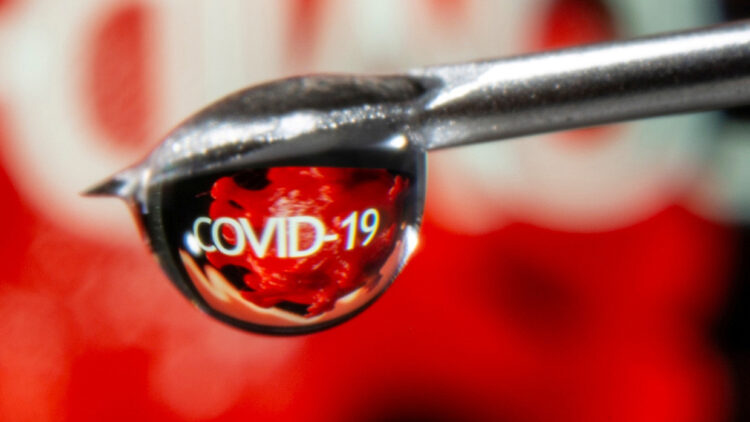
WHO vaccination scheme at ‘very high’ risk of failure, leaving poor nations without Covid-19 shots until 2024
Lawyer Sidney Powell briefly joined Trump’s legal team claiming massive electoral fraud and promising to ‘release the Kraken’ to prove exactly that (the Kraken is the sea monster from Scandinavian folklore that ate its enemies). Needless to say, no Kraken ever emerged from the deep. Now she says ‘big government’ would split the US population into the vaccinated and the not vaccinated – the vaccinated being under permanent government surveillance. She tweeted: “This is more authoritarian communist control imported straight from #China.”
And lots of people on the Internet have decided there’s something dodgy about that Bill Gates bloke, other than the fact he’s a geeky billionaire with a weird voice. The co-founder of Microsoft doesn’t want to do a bit of good with all those billions of dollars he made from Windows, Word and the Xbox. He doesn’t want to wipe out polio and malaria, if he can. No, oh no. He wants to monitor and, presumably, control everyone’s life.
But, hang on a sec, slow down … why? That’s a little word but it’s a huge question… WHY?
Listen anti-vaxxers and conspiracy theorists, I don’t mean to burst your social media bubbles, but really – honestly – you’re not that interesting.
Leaving aside the fact that this microchip technology doesn’t even exist yet, imagine how many billions of dollars it would cost to get an implant into everyone. Imagine how many further billions it would cost to monitor every spit and cough of every daily life. Imagine the manpower, the amount of data.
Imagine the deep level of utterly secret intergovernmental collaboration that would be required? It took four years to negotiate fish quotas after Brexit.
And to find out what, exactly? That you have an obsession with Star Wars and spend way way too much time on the Internet? Your taste in porn? That you eat way too much fast food?
It’s like all those JFK assassination conspiracy theorists online. Almost 60 years and generation after generation of the world’s best investigators, journalists and the biggest of brains plus Hollywood director Oliver Stone couldn’t disprove the official line on who shot President John F Kennedy. No. But along comes Chuck from Wisconsin with his internet connection and… Bingo! Chuck’s cracked it … JFK committed suicide!
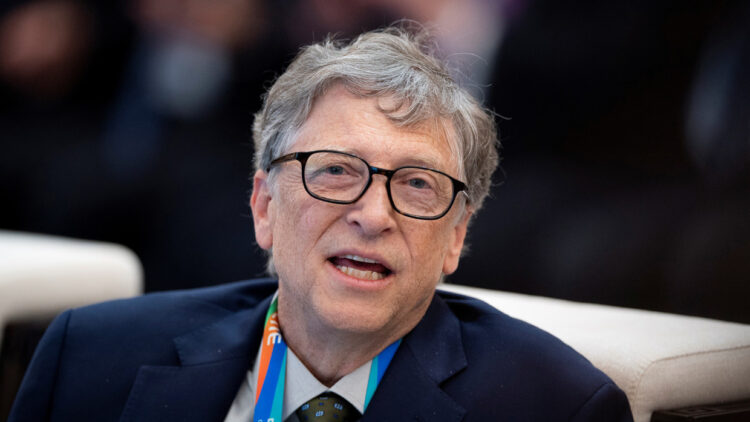
Bill Gates says bars and restaurants should ‘sadly’ be closed for 4-6 months, no return to ‘normal’ until 2022
Here’s a quick test, a question with a digital pat on the back for anyone who can guess the answer.
What have the people who reckon Donald Trump was robbed of the presidency in a massive – yet invisible and unsubstantiated – fraud got in common with the people who think a vaccine is a quest for government control?
Everything. They’re the SAME people.
You can bet your bottom dollar that a sizable slab of those folks who ran amok in the Capitol are among them. They might have been wearing face paint and horns but don’t be fooled; these folks were actually America’s brightest and most polished minds. The USA has more Nobel prize winners than any other nation, by far, remember.
As these mighty warriors climbed and scuttled around howling about freedom, they didn’t get the irony that it was the political system they were denigrating that had actually provided them with the freedom to be so absurd. And it seems some of these mask-free morons breathed Covid-19 everywhere, at least three lawmakers have since tested covid positive.
It’s not just the Americans though, oh no.
It’s the French too. France was the home of Louis Pasteur, the man who actually invented the first vaccine – against rabies. Funny that. Rabies is a disease you don’t hear so much of, these days. When was the last time you saw a rabid man running naked down your street?
A recent opinion poll found that only 39 per cent of French people said they’d get the vaccine (as compared to 80 per cent for Brits and 47 per cent for Americans).
Britons are the 2nd most willing of any nation to take the COVID-19 vaccine (% willing to take/already taken)
🇹🇭 83%
🇬🇧 80%
🇩🇰 70%
🇲🇽 68%
🇮🇳 67%
🇪🇸 66%
🇦🇺🇮🇹 64%
🇨🇳 61%
🇲🇾 60%
🇳🇴 57%
🇮🇩🇦🇪 56%
🇸🇪 55%
🇩🇪🇸🇦 51%
🇫🇮 50%
🇸🇬🇺🇸 47%
🇵🇭 46%
🇹🇼 41%
🇭🇰40%
🇫🇷39%
🇵🇱28%https://t.co/q7ER3yy0tz pic.twitter.com/QNUPeV541j— YouGov (@YouGov) January 15, 2021
Some wealthy folk are heading in the opposite direction, by spending £25,000 on a special concierge service to fly to the United Arab Emirates or India just to jump the jab queue.
Personally, I would prefer to wait a wee while. I hate needles. At least I didn’t have to go first, though. That nice old dude Joe Biden did. If the incoming president and thousands of others start to inflate or their heads go green – then you can be sure something’s gone horribly wrong.
It’s the speed of the testing regime and approval that could be a mild worry, not some moronic assertion about micro chips. Think about it, what else can the world do? Do you want to go out for a beer again with your mates or what? Do you want to dance around your hand bag in a packed nightclub? Go and watch a football match?
Yet it would be very wrong to actually force anyone to have a vaccine against their will. It’s also very wrong to stop people having their view about vaccines online, even if it does fly fully in the face of science. There are at least 31million people who follow anti-vaccine groups on Facebook, and there have been – of course – calls for them to be booted off social media, a la Donald Trump.
So, I can see the risk from a medical cock-up. But Big Government or Bill Gates planting a microchip? Nah. That’s absolutely and utterly ridiculous, bone-headed. Just get off the web for an hour or two, Chuck, and go out for a walk in the fresh air. You could even eat out, McDonald’s and Burger King are still open in your neck of the woods.
There can really only be one reason Bill Gates or Bill Clinton or Betty Boo or Bugs bloody Bunny would ever want to get a chip into your brain and that’s … advertising. To sell you crap you don’t need and never knew you even wanted.
On that note, I’m off to the shops…
You may like
-


Disgraced ex-PM Liz Truss seeks to ruin any hopes for normal UK-China ties
-


India facing challenge to steer SCO agenda away from Western-dominated frameworks
-


China isn’t the biggest threat to Italy’s prosperity
-


Meet the Czech lawyer who rallies thousands to shake up the EU establishment
-


UK shows signs of good will to China, but it’s not the one calling the shots in this relationship
-


China’s economy beats the grim predictions of Western wishful thinkers
OPINION
Disgraced ex-PM Liz Truss seeks to ruin any hopes for normal UK-China ties
Published
11 months agoon
May 18, 2023
The former premier’s Taiwan trip is nothing but a provocation for Beijing to lash out at London, sinking any constructive dialogue
Liz Truss will always be remembered as a disastrous prime minister who spent only a month in office and was outlasted by a head of lettuce.
Her disastrous budget plans sent shudders through the UK economy, eliciting criticism from the British people, MPs and foreign leaders alike. Her ideology-driven political decisions found little sympathy with the public, which repaid her with abysmal approval ratings.
You’d think someone like that would have little credibility as a political adviser, but that apparently isn’t the case. Taiwan, which frequently pays washed-up Western right-wing fanatics to come and visit them as a political stunt, invited Liz Truss to Taipei on Tuesday and Wednesday.
Truss then gave a hawkish speech where she called for an end to all cooperation and dialogue with Beijing and the preparation of Russia-style sanctions in the event of a Taiwan conflict. She also repeated her suggestion of an “Economic NATO” – despite a track record that makes her the last person you’d want to listen to for economic advice.
‘Economic NATO’ needed to counter China – Truss
Since her brief stay in Downing Street, she has rebranded herself as a full-time anti-China hawk, and now uses her party position and credentials as a former prime minister to try to undermine her successor’s attempts to carefully edge back towards engagement with China. Truss was always a fantasist, a pro-Brexit zealot who embraced a confrontational stance during her time as foreign secretary.
However, as you can imagine, all you need to do to reinvent yourself these days is to become a China basher. It doesn’t matter how much of a joke you otherwise might be. Hence, the UK media made sure that her stay and words in Taiwan were given widespread coverage without the context of her political failures. The UK government has already distanced itself from her trip – a fact that Beijing should take careful notice of (and no doubt has).
The British Conservative Party has always been rife with that sort of factionalism. While the opposition Labour Party tends to hard-line suppress the more ideological wing of its MPs (hence the purge of the left-wing Corbynite faction), Tory ideologues have long held power as a “disruptive” force on the government itself, undermining its foreign policy. It’s a fracture which emerged during the Margaret Thatcher era, where following the breakdown of the “post-war consensus” of economic pragmatism, ideology gained ascendency in the party and soon manifested into Euroscepticism.
This tug of war lasted 30 years, making it harder for Conservative prime ministers to maintain a working relationship with the EU, and eventually culminating in Brexit itself. Once that was out of the way, these ideologues found a new target: China. While Truss has opportunistically jumped on this bandwagon, former arch-Brexiter Iain Duncan Smith had already made himself the UK’s Sinophobe-in-chief. Their common goal is simply to undermine stable ties with Beijing and provoke conflict by spurring on backbench rebellions, making them a challenge for the government to handle.
Taiwan predicts timeline for conflict with China
Consequently, while Truss may be a national laughingstock thanks to her disastrous tenure as prime minister, this new role she is taking on enables her to cause disruption on this issue. Taiwan, of course, knows this, because its entire foreign policy is premised on trying to undermine the ties of other countries’ relationships with Beijing by spending large amounts of money on inviting figures such as Truss. The timing of the trip was deliberate, coming immediately after the British foreign secretary’s engagement with a senior Chinese official following the coronation of King Charles III.
Taipei hopes that Beijing’s backlash over the Truss visit will target the UK government as a whole and punish the country. China has a record for being abrasive like this, having done so with the Czech Republic in the past and not winning any friends there as a result. If Truss is therefore allowed to dictate the flow of UK-China relations, she wins. Besides her, the UK has never been provocative on Taiwan at a senior level such as with former Speaker of the House Nancy Pelosi’s visit last year for the US.
Thus, rather than causing a crisis, China should wait until the upcoming Taiwan elections take place and hope that the more pro-China Kuomintang Party (KMT), which once governed the whole country, will take power and stabilize cross-strait ties again. The Democratic Progressive Party (DPP) thrives off creating crises, as does the US with its military deployments, and amidst it all there is no intention for cool heads to prevail. While Pelosi was a blatant violation and huge provocation of the One China policy and US commitment to it, the Truss trip is an opportunistic PR stunt by a washed-up has-been who almost ran her country into the ground in a month. Ignore, move on and forget.
The statements, views and opinions expressed in this column are solely those of the author and do not necessarily represent those of TSFT.
You can share this story on social media:
PLEASANT MUSIC FOR YOUR CAFE, BAR, RESTAURANT, SWEET SHOP, HOME
SUITABLE MUSIC FOR YOGA LOVERS
OPINION
India facing challenge to steer SCO agenda away from Western-dominated frameworks
Published
11 months agoon
May 17, 2023
The Shanghai Cooperation Organisation is looking at ways to address the most pressing global issues without being a disruptive influence
The upcoming Shanghai Cooperation Organization (SCO) summit promises to be a watershed moment in the bloc’s history, coming amid unprecedented global challenges and new, emergent tensions.
While the SCO Foreign Ministers meeting, which took place on May 4 and 5, was tasked with preparing the agenda for the July 3-4 summit in New Delhi, there is still much work to do to ensure that India’s chairmanship will be a success.
The West has broken virtually all links with Russia because of the Ukraine conflict. Western sanctions against Russia are unprecedented in scope, carrying significant ramifications also for the developing world, including the economic disruptions caused by the weaponization of the US dollar. The European security architecture is in tatters. For the West to seek Russia’s strategic defeat while the country possesses formidable military and material resources makes no sense. Risking a potential nuclear conflict in particular is totally irresponsible.
The European Union has lost its already limited capacity to play an independent role, especially with Germany losing clout and Brussels appropriating more power. The doors of dialogue and diplomacy are being kept closed as NATO seeks military advantage over Russia, and uses Ukraine as a proxy.
At the other end of Eurasia, US-China tensions are rising over Taiwan, regional maritime disputes, strengthening of US-centered regional alliances and NATO overtures to Japan and South Korea. The US and the EU are warning China against supplying lethal arms to Russia under pain of sanctions, even as they seek China’s support in persuading Russia to end its military intervention in Ukraine, and this in the background of the high-level dialogue between the US and China having virtually broken down.
Can Eurasia’s rising political bloc show a united front against the West’s encroachment?
Both Russia and China, the principal pillars of the SCO, are at loggerheads with the West to different degrees, and the summit agenda will inevitably reflect this reality. The SCO represents a building block of multipolarity within the global system at the political, economic and security levels, a goal reiterated at the Foreign Ministers’ meeting.
While the other SCO members have robust links to both Russia and China, their connections with India are not as strong, despite mutual goodwill and shared interests. This is largely due to a lack of contiguity and direct access to Central Asia. With Iran and Belarus joining as full members, the SCO will achieve greater Eurasian depth. Both of these countries have been politically and economically targeted by the West. The SCO Foreign Ministers meeting also agreed on May 5 to grant dialogue partner status to Kuwait, the Maldives, Myanmar and the UAE, in addition to the nine existing dialogue partners. The growing interest demonstrates the appeal of the SCO as a grouping of non-Western countries that provide an alternative platform for nations to pursue their interests outside the Western-dominated international system.
Association with the SCO increases their margin to maneuver, primarily at the political and economic levels. Diplomatic support, hedging against Western sanctions, access to non-Western development banks, benefits from connectivity projects and infrastructure development, cooperation against terrorism, extremism and separatism, are obvious advantages.
India has taken its current presidency of the SCO seriously, organizing and hosting more than 100 meetings and events, including 15 ministerial level meetings. Indian Foreign Minister Subrahmanyam Jaishankar has also stressed the great importance for India of developing multifaceted cooperation. He introduced the term ‘SECURE’ SCO on the basis of Security, Economic Development, Connectivity, Unity, Respect of sovereignty and territorial integrity, and Environmental protection.
As SCO Chair, India initiated an unprecedented engagement with the organization’s Observers and Dialogue Partners by inviting them to participate in more than 14 socio-cultural events. Many of the events hosted by India occurred for the first time in the framework of the SCO, such as the Millet Food Festival, Film Festival, Cultural Festival, the Tourism Mart, and Conference on Shared Buddhist Heritage.
Moscow Region representatives conduct roadshows to entice Delhi and Mumbai investors
Jaishankar noted that as a result of the Covid-19 pandemic and geopolitical upheavals, global supply chains had been disrupted, leading to a serious impact on delivering energy, food, and fertilizers to developing nations. He viewed these challenges as an opportunity for SCO members to address them collaboratively, noting that with more than 40% of the world’s population within the SCO, its collective decisions would surely have a global impact.
Additionally, Jaishankar highlighted the unabated menace of terrorism, and that combating it was one of the original mandates of the SCO. He drew attention to the unfolding situation in Afghanistan where the immediate priorities included providing humanitarian assistance, ensuring a truly inclusive and representative government, combating terrorism and drug trafficking and preserving the rights of women, children and minorities. This was echoed by the Chinese foreign minister.
India expressed its willingness to share its expertise and experience in the field of startups having helped cultivate over 70,000, more than 100 of which were ‘unicorns’. Last year, it proposed the creation of a Startups and Innovation working groups as well as one focused on traditional medicines, and the SCO meeting approved plans to operationalize these initiatives.
India believes that the SCO should look at reform and modernization to keep the organization relevant in a rapidly transforming world, and noted that discussions on these issues had already commenced. It also sought support for its long-standing demand to make English the SCO’s third official language, as this would enable a deeper engagement with English-speaking members and would take the SCO’s work to a global audience.
India also proposed the New Delhi Declaration as an SCO Summit Declaration at the meeting, as well as four other thematic joint statements on cooperation in de-radicalization strategies, promotion of millets, sustainable lifestyles to address climate change and digital transformation. India sought support for a timely finalization of these documents for approval at the SCO Summit.
Indian delegation wraps up successful business tour in Russia
According to Chinese Foreign Minister Qin Gang, all participating parties considered the SCO as an important platform for joint combat against terrorism, separatism, drug trafficking, as well as cyber crimes. All favored more cooperation in such fields as transportation, energy, finance, investment, trade, the digital economy, regional connectivity, deeper cultural and people-to-people exchanges, environmental protection, climate change, sustainable development, and SCO’s strengthened cooperation with the United Nations and BRICS countries.
The meeting also offered the gathered foreign ministers an opportunity for intense bilateral meetings. For example, Russian Foreign Minister Lavrov met his Chinese counterpart to discuss the implementation of agreements reached between Vladimir Putin and Xi Jinping in March.
The SCO continues to enlarge its footprint, widen its agenda, and carve out a non-Western space in the international system, but some key points of friction remain between members especially China and India. The two countries are currently embroiled in a border dispute that has yet to be settled. Additionally, India stands in opposition to China’s Belt and Road Initiative due to India’s concerns about connected sovereignty issues.
The other, less important fault line, is India-Pakistan relations. Pakistan’s Foreign Minister Bhutto Zardari did not help matters by making indirect jibes at India during his speech at the SCO meeting and further criticism of New Delhi in his interviews to the media. His comments elicited a sharp response by the Indian Foreign Minister, but only after the SCO meeting was completed. Pakistan is currently in the throes of a major internal crisis, which may affect its participation in the SCO summit. However, India-Pakistan differences are not germane to the SCO’s growing stature. Far more important is the Russia-India-China triangle.
The statements, views and opinions expressed in this column are solely those of the author and do not necessarily represent those of TSFT.
You can share this story on social media:
PLEASANT MUSIC FOR YOUR CAFE, BAR, RESTAURANT, SWEET SHOP, HOME
SUITABLE MUSIC FOR YOGA LOVERS
OPINION
China isn’t the biggest threat to Italy’s prosperity
Published
11 months agoon
May 16, 2023
Rome is considering leaving the Belt and Road Initiative in a move which will place virtue signaling to other Western states above its own interests
Italy’s membership of China’s Belt and Road Initiative (BRI) is up for renewal at the end of this year, and Western media outlets are speculating that Rome may choose to leave the pact.
Italy became the first and only G7 nation to join China’s multi-billion-dollar infrastructure vision, signing a memorandum of understanding (MoU) just before a tidal wave of anti-China sentiment was unleashed on the world. Indeed, the country’s leadership was in a very different place then, with Italy being led by Giuseppe Conte of the Five Star Movement, whose populism faulted the Euro-Atlantic establishment for decimating the Italian economy through the 2008 debt crisis and the brutal austerity measures which followed. It is little wonder that Italy had decided to look eastwards.
Even 15 years on from the events of 2008, Italy’s economy still has not fully recovered. It was worth $2.4 trillion at the end of that year, but is only at $2.1 trillion now, and barely growing at all. New and concurrent economic crises have taken a toll. Italy’s current leadership no longer believes all roads lead to Rome, let alone to China’s modern-day Silk Road – rather, they lead to Washington. As pressure on the country has grown, its successive leaders, Mario Draghi and Giorgia Meloni, have sought to reset its foreign policy back to transatlantic-oriented goals, ending its rebellion against the establishment and thus contemplating quitting China’s grand initiative.
Italy may exit ‘New Silk Road’ – FT
Oddly enough, the truth remains that it is the EU and US that stand as the biggest threat to Italy’s prosperity, not China. While dumping the BRI will receive plaudits from the US-dominated commentary circles in these countries, the reality is that they offer no alternative, no plans, and no incentives to make Italy a wealthier country. It is the “sick man” of the G7, an advanced economy that has increasingly lost its competitiveness, but also one that has been thrust into decline by being a southern EU country and a net loser of Eurozone policies.
It is precisely because of the economic upheavals that the country has faced over the past 15 years and widespread political dissatisfaction, that radical and populist politics have gained ground. China was rightfully seen as an alternative, a country that could rapidly expand Italy’s exports and invest in crumbling public infrastructure. However, this has quickly become politically incorrect. Italy’s leaders argue that BRI participation has been a waste of time. However, the reality is that when Eurocrat Mario Draghi came to office, he sought to reset Italy’s foreign policy and began using new “golden powers” to veto and cancel Chinese investments in Italy on a large scale. In 2021 alone, he blocked three Chinese takeovers, including a seed and vegetable producer.
Following Draghi, Giorgia Meloni, despite her outward populism, has been even more prone to pledging Rome’s loyalty to the transatlantic cause, having decided to become vocal in support of Ukraine in its conflict with Russia and even visit Kiev. At this stage, it is very little surprise that her country is contemplating canceling participation in the BRI, something which can score political points and help dispel doubts about her loyalty to Brussels and Washington. Predictably, the mainstream media narrative readily depicts the BRI in predatory and malign terms, ignoring the obvious empirical truth that it is the EU that has saddled Italy with a national debt larger than its GDP, and not China. Of course, there is no alternative scheme or plan for Italy on offer should it leave the BRI, meaning it is cutting its nose off to spite its face.
EU defenseless against China – Berlusconi
By forfeiting its BRI membership, Italy will undoubtedly lose the opportunity to massively enhance its trade competitiveness, namely by opting out of projects such as Chinese-owned ports and railway links. As an example of this, Greece, to the southeast, has positioned itself as a “gateway to Europe” through Chinese ownership of Pireaus port and its connecting railways, which allows cargo to go up through the Suez Canal into the Mediterranean, into the port and then across Europe. Italy could have competed for a share of this, but it has chosen not to, and it’s not like it will be selling anything additional to the US with its protectionist “America first” policies, is it?
In doing so, Italy has chosen to stop being a leader pursuing its own path in the world to better strengthen its global clout, but instead to be a follower, to play second fiddle to the transatlantic establishment which doesn’t see it as a particularly prominent partner to begin with. Italy joined the BRI precisely because it was sick of being a “rule taker” from Brussels, in a similar vein to what Greece has experienced. Now it appears happy again to hold up the political orthodoxy of the elitist, US-led G7. In doing so, it can kiss goodbye any hopes of becoming a powerful and influential country again anytime soon. Italy is admired mostly for its past, as opposed to what it offers to the world presently, and if its current leadership has its way, that will likely remain the case.
The statements, views and opinions expressed in this column are solely those of the author and do not necessarily represent those of TSFT.
You can share this story on social media:
PLEASANT MUSIC FOR YOUR CAFE, BAR, RESTAURANT, SWEET SHOP, HOME
SUITABLE MUSIC FOR YOGA LOVERS



Global debt balloons to record highs

German military to sell tons of toilet paper

First female Saudi astronaut heads to space

Nigeria takes step to combat fuel shortages

US will default if debt deal fails – treasury secretary

Village People demand Trump stop using their music

Hollywood star pulls out of hosting awards show amid strike

Rock icon slams German authorities

Agatha Christie novels chopped by ‘sensitivity readers’ – media

Marvel star back in training after breaking over 30 bones

Turkish minister escapes fire blast (VIDEO)

Trump savages pop star’s Super Bowl performance

Alec Baldwin sued by Ukrainian family of slain cinematographer

Duran Duran stumbles, Dolly Parton rolls into Rock Hall

Sweden probes possible plot behind Russian pipeline leaks

FINANCE


Global debt balloons to record highs
It’s now $45 trillion higher than its pre-pandemic level and is expected to continue growing rapidly, a top trade body...


Nigeria takes step to combat fuel shortages
The West African country has built a giant oil refinery to cover domestic demand Nigeria will commission its new Dangote...
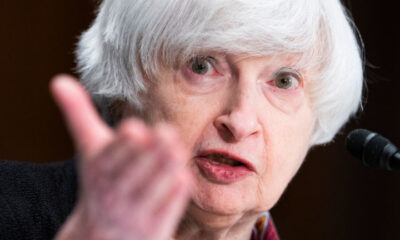

US will default if debt deal fails – treasury secretary
The current borrowing limit is a constraint on Washington’s ability to meet its obligations, Janet Yellen insists America’s chances of...


Facebook parent Meta fined €1.2 billion by Irish watchdog
The American tech company has been accused of violating EU data privacy rules US tech giant Meta has been hit...


UK’s business with sanctioned country booming
Trade between Britain and Iran has reached the highest level in a decade, according to official data, apparently having been...

POLITICS


Erdogan election defeat would be ‘revenge’ – Syrian Kurds
The YPG claims the Turkish president failing to win another term would be payback for Ankara’s counter-terrorism operations in Syria...


Chinese special envoy meets with Zelensky
Li Hui visited Kiev to share Beijing’s views on a political settlement to the Ukraine crisis Ukrainian President Vladimir Zelensky...


Pakistan’s top court orders release of former PM Imran Khan
Pakistan’s Supreme Court has ordered the release of former prime minister Imran Khan, whose arrest earlier this week triggered deadly...


Kamala Harris to run AI taskforce
The US vice president will ask AI execs to evaluate the safety and fairness of their models US Vice President...
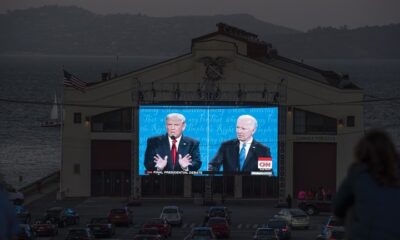

Most Americans want to move on from Biden and Trump – poll
70% of respondents said the incumbent shouldn’t bid for office in 2024, with that figure 60% for the Republican former...

OPINION


Disgraced ex-PM Liz Truss seeks to ruin any hopes for normal UK-China ties
The former premier’s Taiwan trip is nothing but a provocation for Beijing to lash out at London, sinking any constructive...


India facing challenge to steer SCO agenda away from Western-dominated frameworks
The Shanghai Cooperation Organisation is looking at ways to address the most pressing global issues without being a disruptive influence...


China isn’t the biggest threat to Italy’s prosperity
Rome is considering leaving the Belt and Road Initiative in a move which will place virtue signaling to other Western...


Meet the Czech lawyer who rallies thousands to shake up the EU establishment
In mid-April, a fledgling political party that recently formed in the Czech Republic called Pravo Respekt Odbornost (Law Respect Expertise;...


UK shows signs of good will to China, but it’s not the one calling the shots in this relationship
The British foreign secretary says antagonizing Beijing goes against London’s ‘national interests’, but Washington has other ideas British Foreign Secretary...

LIFE


conic Smiths bassist dies aged 59
The bassist with legendary English rock band The Smiths, Andy Rourke, has died at the age of 59, the group’s...


Village People demand Trump stop using their music
A viral video emerged last week of Donald Trump dancing to a Village People song at his Florida estate Village...


Hollywood star pulls out of hosting awards show amid strike
Drew Barrymore is stepping down as host of this year’s MTV Movie & Music Awards, due to be held on...
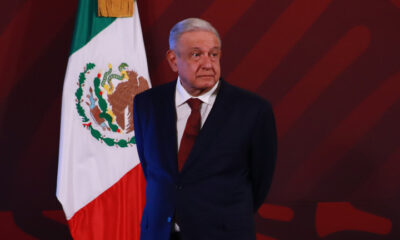

Mexico condemns US ‘interference’ in drug war
The DEA’s infiltration of the Sinaloa Cartel without state permission amounts to espionage, the Mexican president says Mexican President Andres...


Rock icon slams German authorities
Pink Floyd co-founder Roger Waters criticized the city of Frankfurt for canceling his concert and vowed to take legal action...



Trending
-

 TECHNOLOGY12 months ago
TECHNOLOGY12 months agoHow much YouTube pays for 1 million views, according to creators
-

 FINANCE11 months ago
FINANCE11 months agoFacebook parent Meta fined €1.2 billion by Irish watchdog
-

 LIFE12 months ago
LIFE12 months agoHollywood star pulls out of hosting awards show amid strike
-

 LIFE11 months ago
LIFE11 months agoconic Smiths bassist dies aged 59
-
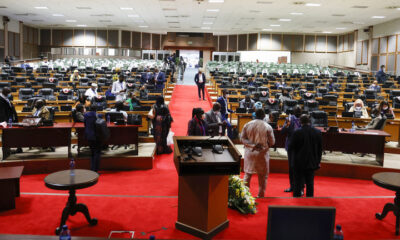
 NEWS11 months ago
NEWS11 months agoKenya supports creation of pan-African court
-

 FINANCE11 months ago
FINANCE11 months agoUS will default if debt deal fails – treasury secretary
-

 FINANCE11 months ago
FINANCE11 months agoGlobal debt balloons to record highs
-

 WAR11 months ago
WAR11 months agoUkraine won’t join NATO anytime soon – Scholz


